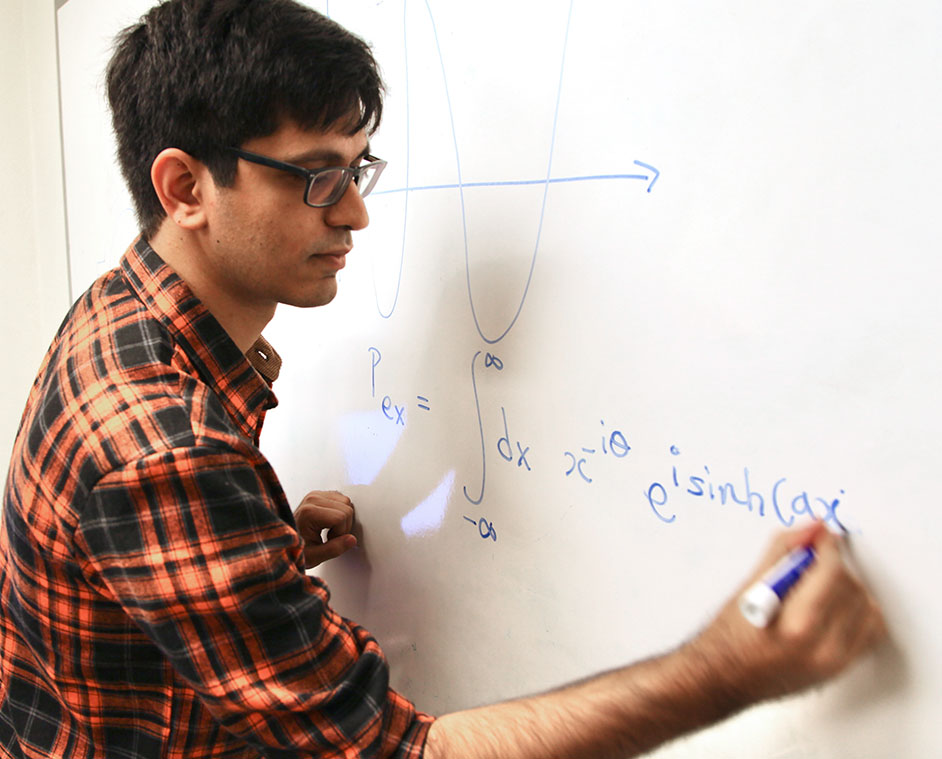Chakraborty’s Research to Involve Simulations of Quantum Field Theories
Abhijit Chakraborty, a recent Ph.D. graduate in physics from the University of Houston, received the prestigious Institute of Quantum Computing (IQC) Postdoctoral Fellowship. He will conduct research with Prof. Christine Muschik on quantum simulations of quantum field theories.

IQC, a part of University of Waterloo in Canada, is a world-leading institute in quantum computing. Chakraborty graduated from Carlos Ordonez’s group in the Department of Physics in Summer 2022 and started his position at IQC in November.
At IQC, Chakraborty will try to simulate lattice quantum chromodynamics (lattice QCD) on the IBM quantum computers. It is an interesting, yet challenging, problem as simulating lattice QCD on a classical computer requires a huge amount of resources.
The question that Chakraborty will try to answer is whether it is possible to use the supremacy of quantum computers to simulate QCD on a lattice more efficiently. An affirmative answer may lead scientists to answer deep questions about the formation of particles at the very beginning of our universe.
During his graduate studies at UH, Chakraborty worked on the role of symmetries in quantum field theory in curved spacetime, with a focus on understanding the relation between the quantum theory and Einstein’s general relativity – the two fundamental theories that have yet to find complete agreement with each other.
According to general relativity, a black hole is a region in spacetime known for engulfing everything that comes within its gravitational pull, allowing no light or any other radiation to come out of it. However, quantum theory predicts that a black hole can radiate heat with an almost undetectable temperature (in the order of nanokelvins). This is known as the Hawking radiation. This allows physicists to consider a black hole as a thermodynamic system.
“Understanding the origin of this thermodynamic nature of black holes has enormous implications in quantum information theory, in addition to reconciling quantum mechanics and general relativity,” Chakraborty said.
Chakraborty and Ordonez, along with their collaborators Marlan Scully at Texas A&M University (a pioneer in quantum optics, also known as the quantum cowboy), and Horacio Camblong at the University of San Francisco, used a novel quantum-optics based approach to provide new insights into the black-hole thermodynamics problem. In this work, they showed that the scaling symmetry of quantum fields near the boundary of a black hole (called the event horizon) plays a crucial role in defining the thermal nature of the radiation.
The theory of this scaling symmetry is known as conformal quantum mechanics (CQM) and has previously been used by physicists in ultra-cold atomic systems as well. These results establish that CQM, the simplest scale-invariant theory, is powerful enough to explain the quantum physics of molecules, as well as the quantum physics of black holes. The same theory governing the behavior of a microscopic system and an astronomical system is indeed one of the beauties of physics.
During his Ph.D., Chakraborty led four projects in the group and published seven papers in respected journals which is considered a commendable achievement in the field of theoretical physics. He received the competitive Division of Particles and Fields Travel Award and Forum of Graduate Students Affairs Travel Award to present his work in 2022 at the Annual American Physical Society April Meeting, one of the largest conferences in physics.
"Abhijit is one of the best students I've seen in all my years at UH,” Ordonez said. “In record time, he was actively working with me and my colleagues in quantum anomaly aspects of ultracold fermi gases, and later on became a key player in my group's work on a quantum optics approach to Unruh and Hawking radiation. He became a de-facto postdoc, collaborator and senior adviser to younger members of my group at UH.”
Apart from research, Chakraborty loves teaching and explaining complex scientific principles to his colleagues in layman's terms. He believes this experience helped him get the best poster award in the Department of Physics Research Showcase competition which hosted posters from more than 25 graduate students. He was also ranked among the top 10 best poster presenters in the university-wide Graduate Research Showcase in spring 2021.
Chakraborty always felt a part of the community at UH because of the diverse culture that students from all around the world bring to the university.
“This made me realize the importance of diversity and inclusion in science,” he said. “To give something back to the community, I’ve been involved in initiatives led by Dr. Ordonez to help develop a quantum workforce in under-represented communities.”
Ordonez and Chakraborty also developed the first graduate-level quantum computing course offered in the department.
“Abhijit’s expertise in quantum field theory and passion in quantum computing made him a strong candidate to apply for the postdoctoral position at IQC.” Ordonez said.